Welcome to the page about the Lancaster Red Rose Amateur Operatic and Dramatic Society shows from 1950 to 1959. Below is information about the musicals the society staged in the 1950’s which include: The Quaker Girl (1950); Irene (1951); Jill Darling (1952); The Marriage Market (1953); A Country Girl (1954); Sally (1955); Wild Violets (1956); Hit The Deck (1957); The Student Prince (1958); The Desert Song (1959).
There are also pages for the Red Rose AODS shows from … 1930’s … 1940’s … 1950’s … 1960’s … 1970’s … 1980’s … 1990’s … 2000’s … 2010’s … 2020’s … back to Lancaster Red Rose AODS.
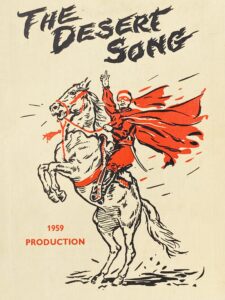 1959: The Desert Song
1959: The Desert Song
1959 saw Lancaster Red Rose AODS do their 22nd show ‘The Desert Song’ which was staged at the Grand Theatre, Lancaster.
This was the second time the society had done the show as it had previously done the show in 1945.
The 1926 operetta – with music by Sigmund Romberg; lyrics by Otto Harbach; and book by Oscar Hammerstein II, Otto Harbach and Frank Mandel – was inspired by stories of Lawrence of Arabia aiding native guerrillas in the 1925 uprising of the Riffs [Berber fighters, against French colonial rule in Morocco].
It tells the story of headstrong Margot and her father, Gen. Birabeau arrive in a remote Foreign Legion outpost. The powerful Sheik Yousseff has devised a scheme to discredit the mysterious warlord El Khobar by having his men attack the fort disguised as Berbers, a plan Margot and her tutor, Paul Bonnard attempt to foil.
Musical numbers include: High on a Hill; The Riff Song; Ho, Bold Men of Morocco; Margot; I’ll be a Buoyant Girl; Why Did We Marry Soldiers?; French Military Marching Song; Romance; Then You Will Know; I Want a Kiss; It; Girls; The Desert Song; My Little Castagnette; Song of the Brass Key; One Good Boy Gone Wrong; Eastern and Western Love (Let Love Go; One Flower in Your Garden; One Alone); The Sabre Song; All Hail to the General; Let’s Have a Love Affair.
More production details to follow.
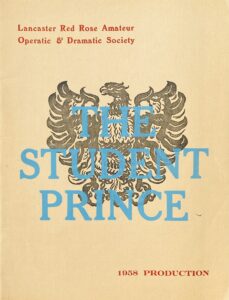 1958: The Student Prince
1958: The Student Prince
1958 saw Lancaster Red Rose AODS do their 21st show ‘The Student Prince’ which was staged at the Grand Theatre, Lancaster.
The 1924 operetta – with music by Sigmund Romberg; and lyrics and book by Dorothy Donnelly – is based on Wilhelm Meyer-Forster’s play Old Heidelberg and has a prologue and four acts.
It opened in December 1924 at Jolson’s 59th Street Theatre on Broadway and became the most successful of Romberg’s works.
It tells the story of Karl Franz (prince of the kingdom of Karlsberg) who childhood is engaged to Princess Margaret. His grandfather (the king) sends him to improve his social skills at University of Heidelberg. Karl and his cohort enjoy the local inn and student life; and he also falls in love with Kathie (the innkeeper’s niece) and the couple consider eloping. But when Karl learns that his grandfather is dying, he returns to Karlsberg to become the new king, and to honor the arranged marriage which neither he nor the princess wants.
Musical numbers include: Golden Days; Drinking Song; Deep in My Heart, Dear; Just We Two; Serenade (“Overhead the moon is beaming”).
More production details to follow.
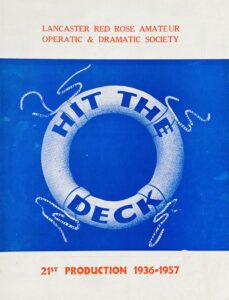 1957: Hit the Deck
1957: Hit the Deck
1957 saw Lancaster Red Rose AODS do their 20th show ‘Hit The Deck’ which was staged at The Grand Theatre, Lancaster…
Although the programme says “21st Production 1936-1957” it was actually their 20th show due to them not doing shows in WWII.
This was the third time the society had done ‘Hit The Deck’ as it was previously staged in 1937 and 1943.
The 1927 musical – with music by Vincent Youmans; lyrics by Clifford Grey and Leo Robin; and book by Herbert Fields – is based on the 1922 play ‘Shore Leave’ by Hubert Osborne. It tells the story of Loulou, the owner of a Newport coffee house who falls in love with Bilge, one of the many sailors who patronise her eatery whenever they’re in port.
Musical numbers include: Join the Navy; What’s a Kiss Among Friends?; Harbor of My Heart; Shore Leave; Lucky Bird; Looloo; Why, Oh Why?; Sometimes I’m Happy (Sometimes I’m Blue); Hallelujah!; Utopia.
More production details to follow.
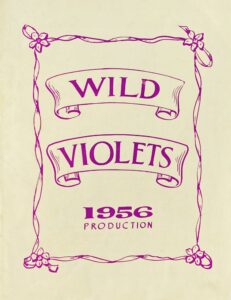 1956: Wild Violets
1956: Wild Violets
1956 saw Lancaster Red Rose AODS do their 19th annual show ‘Wild Violets’ which was staged at The Grand Theatre, Lancaster.
The 1932 musical play by Bruno Hardt-Warden – with music by Robert Stoltz; lyrics by D. Carter; and book by H. Short & D. Carter – opened in the London’s Theatre Royal (Drury Lane) in October 1932.
It tells the story of Paul, Otto and Erik (friends and students at college) who are hoping to see Liesel, Mitzi and Lena at a school reunion. Otto and Liesel are fond of each other. Paul, however, bets that within twenty-four hours he can win Liesel’s affection. The boys go along to see Madame Hoffman, the Headmistress of the girls’ school, to ask for her help during a forthcoming students’ celebration. While she is welcoming a new pupil (Mary Rutherford) Paul intercepts a telegram which is meant to inform Madame Hoffman that the new music master (Dr Franck) will not be able to arrive until the following day. Paul makes an ‘arrival’ at the school disguised as Dr Franck and there is great uproar when the real Dr Franck arrives. Realising that as a result of this episode he will not be allowed near the school again, Paul and Mary arrange a rendezvous outside the school and depart to get married.
Musical numbers include: A Girl Has Got My Heart; Don’t Say Goodbye; Charming Weather; You, Just You; Summer in Our Hearts; Dreaming of Love; I Sort of Knew; Outdoor Girl; Wine In Our Glasses; Wild Violets.
More production details to follow.
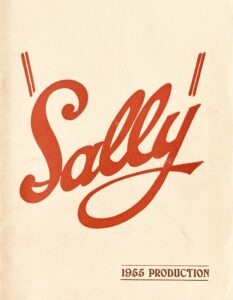 1955: Sally
1955: Sally
1955 saw Lancaster Red Rose AODS do their 18th annual show ‘Sally’ which was staged at The Grand Theatre, Lancaster and was the second time that the society had done the show (last was 1938) .
The 1920 musical – music by Jerome Kern; lyrics by Clifford Grey (and additional lyrics by Buddy De Sylva, Anne Caldwell and P. G. Wodehouse); and book by Guy Bolton – is inspired by the 19th century show, ‘Sally in our Alley’. It tells the story of mistaken identity where Sally (a dishwasher at the Alley Inn in New York City) poses as a famous foreign ballerina and rises to fame through joining the Ziegfeld Follies. It’s a rags to riches story with a wedding as the finale.
Musical numbers include: The Night Time; On with the Dance; Joan of Arc (“You Can’t Keep a Good Girl Down”); Look for the Silver Lining; Sally; Wild Rose; (On the Banks of) The Schnitza Komisski; Whip-poor-will; The Lorelei; The Church Around the Corner; Land of Butterflies (ballet) (music By Victor Herbert); Dear Little Church ‘Round the Corner.
More production details to follow.
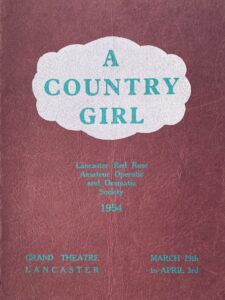 1954: A Country Girl
1954: A Country Girl
1954 saw Lancaster Red Rose AODS do their 17th show ‘A Country Girl’ which was staged from Monday 29th of March 1954 to Saturday 3rd of April 1954 at The Grand Theatre, Lancaster.
The 1902 musical – with music by Lionel Monckton (and additional songs by Paul Rubens); lyrics by Adrian Ross (and additional lyrics by Percy Greenbank); and book by James T. Tanner – was Lionel Monckton’s first score as the principal composer.
It tells the story of Geoffrey, who left the little village of Devonshire to seek his fortune and his girlfriend Marjorie left the village for London. Geoffrey and Marjorie eventually return to the village for an event and unbeknown to all at in Devonshire, Marjorie has become a singing star under an assumed name. Trouble ensues when the Princess Mehelaneh decides that she wants Geoffrey as her husband and Marjorie mistakenly thinks that Geoffrey is also interested in the Princess. However, in the end, it is clear that Geoffrey still only has love for his country girl, Majorie.
Musical numbers include: When the birds begin to sing, out we go a-harvestin; Johnnie came from London Town for a bit of fun; Over the hills and far away, borne on the summer breeze; A sailor’s life’s the life I trow, he works now late, now early; I went to sea as a bold A. B., and I thought when I got on board; When we were children, going through meadows after mowing; Here he comes, here he comes! In his Eastern glory; Oh, Molly was tall and fair to see, her manners were frank, her language free; Come and see them, only see! Never did anyone look so funny!; Two little chicks lived in a farmyard, happy as chicks can be; Over the mountain passes, under the peaks of snow; Hurrah! for the squire, our gallant young squire, head of the house that was head of the shire; From 1795 to 1799, Republican France would dress for a dance in fashions extremely fine; I’m quite the most attractive of all the girls, they say; We are invited everywhere by people we can’t say No to; Mrs. Brown’s a wonder, she’s fifty-six or more; Oh! a sailor loves a chance of a partner at a dance, when his ship comes into port; An actress smiles and an actress sighs, an actress hopes and fears or cries; Time passes slowly by, my little Girlie; Oh, London girls are all so haughty, proud, and chilly; When once I was given to dances, no doubt I committed some faults; You’re a very funny man!” “Oh! really? You’re a very curious girl!;
Yo-ho! little girls, yo-ho! That’s so, little girls, that’s so.
More production details to follow.
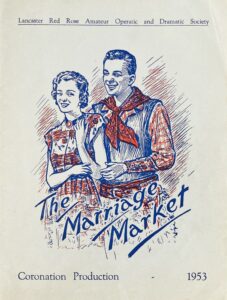 1953: The Marriage Market
1953: The Marriage Market
1953 saw Lancaster Red Rose AODS do their 16th show ‘The Marriage Market’ which was staged at The Grand Theatre, Lancaster. .
The 1911 musical operetta in three acts – with music by Victor Jacobi and libretto by Miklos Brody and Ferenc Martos – and premiered at the Kiraly Szinhaz (The King Theater) in Budapest.
The musical moved to Daly’s Theatre in London in 1913; and to the Knickerbocker Theatre on Broadway in the same year. Lyrics were by Arthur Anderson and Adrian Ross; and the American adaptation was completed by Gladys Unger.
Musical numbers include: Little Chiquita; Compliments; Never Count Your Chickens Before They’re Hatched; American Courtship; The One I Love; Come On Boys For This Is Market Day; Hand In Hand; All the Ladies Love a Sailor Man; Love Of Mine; The Middy; June Is In the Air; Answers; How Things Happen; It’s Late Now; Jilolo.
More production details to follow.
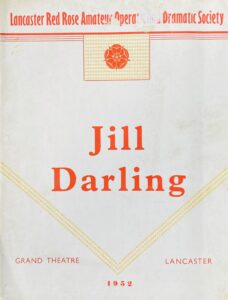 1952: Jill Darling
1952: Jill Darling
1952 saw Lancaster Red Rose AODS do their 15th show ‘Jill Darling’ which was staged at The Grand Theatre, Lancaster. .
The 1934 musical romantic comedy – with music by Vivian Ellis; lyrics by Desmond Carter; and book by Marriott Edgar – was originally presented on tour as “Jack and Jill”.
Opening at ‘The Double Six’ (a road house owned by Colonel Crawford), we meet Jack Crawford, the Colonel’s blundering son who has fallen out with Jill Sonning (an actress). Meanwhile, Election fever is in the air at ‘Bunting Hall’ the seat of Sir Timothy Bunting, a man who advocates temperance and whose aim is to close down ‘The Double Six’. At a party at Bunting Hall in aid of temperance, the Hungarian artiste Sari Tamara turns out to be Jill who has adopted this persona in pursuit of stardom. Over the course of the evening she is reconciled with Jack, who has come to the party in disguise, however Jack’s resemblance to his cousin Pendleton Brooks causes some confusion and complications and eventually his arrest by the Police!
Musical numbers include: I Will; The First Waltz; A British Mother’s Big Flight; Other People’s Babies; You Turned Your Head; Kiss Me Dear; Speech Day; Be Yourself; Perseverance; Nonny Nonny No; Dancing With A Ghost; We’ll Lay Our Heads Together; Pardon My English; I’d Do The Most Extraordinary Things; I’m On A See-Saw; You Turned Your Head; I’m On A See-Saw; The Wind In The Willows; She’s My Lovely.
More production details to follow.
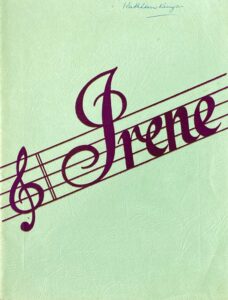 1951: Irene
1951: Irene
1951 saw Lancaster Red Rose AODS do their 14th annual show ‘Irene’ which was staged at The Grand Theatre, Lancaster.
It was the second time Red Rose had done this musical, the last time in 1939.
The 1919 musical – music by Harry Tierney; lyrics by Joseph McCarthy; and book by James Montgomery and Joseph Stein – is inspired by the play ‘Irene O’Dare’ by James Montgomery. It is set in New York City’s Upper West Side and focuses on immigrant shop assistant Irene O’Dare, who is introduced to Long Island’s high society when she is hired by one of its leading grande dames to help redecorate her home.
Musical numbers include: Hobbies; Alice Blue Gown; Castle of Dreams; The Talk of the Town; To Be Worthy (of You); We’re Getting Away with It; Irene; To Love You; Sky Rocket; The Last Part of Every Party; There’s Something in the Air.
More production details to follow.
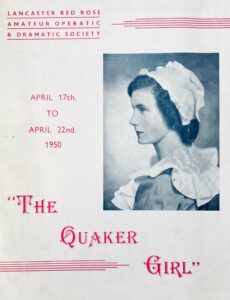 1950: The Quaker Girl
1950: The Quaker Girl
1950 saw Lancaster Red Rose AODS do their 13th show ‘The Quaker Girl’ which was staged from Monday the 17th of April 1950 to Saturday the 22nd of April 1950 at The Grand Theatre, Lancaster. .
The 1910 musical comedy – in three acts – has music by Lionel Monckton; lyrics by Adrian Ross and Percy Greenbank; and book by James T. Tanner. It tells the story of contrasts between dour Quaker morality and Parisienne high fashion. Prudence is thrown out of her house by her quaker parents for drinking a glass of champagne. Later, in Paris, her simple grey dress and bonnet become the height of fashion. The musical opened in the London’s West End at the Adelphi Theatre in 1910 before opening at the Park Theatre on Broadway in 1911.
Musical numbers include: We’ve such a tale to tell; While our worthy village neighbours; Wonderful (O, Time, Time); A Runaway Match; A Quaker Girl; A bad boy and a good girl; Tip-Toe; Just As Father Used to Do; In this Abode (Fashion So Soon Dethrones); Or Thereabouts!; On Revient de Chantilly; Ah Oui and The Little Grey Bonnet; Come to the Ball; A Dancing Lesson; Barbizon; When We Are Rich; A Wilderness and Thou; Tony, from America; Something to Tell; The First Dance.
More production details to follow.
Quick links to Lancaster Red Rose AODS shows of the … 1930’s … 1940’s … 1950’s … 1960’s … 1970’s … 1980’s … 1990’s … 2000’s … 2010’s … 2020’s.